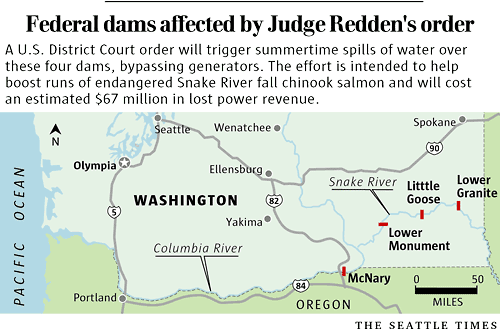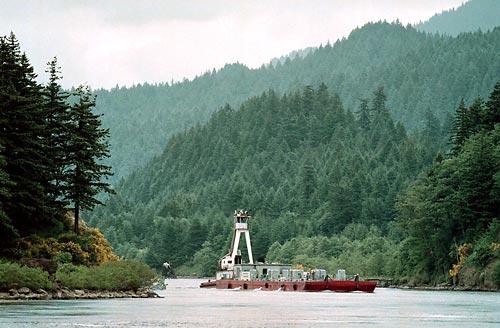forum
library
tutorial
contact

Spill Water Over Dams, Judge Orders
by Hal Bernton, Seattle Times staff reporterThe Seattle Times, June 11, 2005
|
the film forum library tutorial contact |

|
Spill Water Over Dams, Judge Ordersby Hal Bernton, Seattle Times staff reporterThe Seattle Times, June 11, 2005 |
 PORTLAND -- A federal judge yesterday ordered more water spilled this summer at four federal dams along the Snake and Columbia rivers in an effort to boost an endangered run of chinook salmon.
PORTLAND -- A federal judge yesterday ordered more water spilled this summer at four federal dams along the Snake and Columbia rivers in an effort to boost an endangered run of chinook salmon.
The unprecedented order also could nudge up federal wholesale power rates by 4 or 5 percent, as well as Seattle City Light residential rates by about 1 percent, according to Bonneville Power Administration and City Light officials.
The spills would begin later this month and run through Aug. 31, with water passing over the dams rather than running through power-generating turbines. The dams would forgo generating an estimated $67 million worth of electricity.
U.S. District Judge James Redden's order is intended to create a more salmon-friendly river that would reduce the need to barge salmon smolt during their downstream migration to ocean feeding grounds.
It could be the first in a series of changes to management of the federal hydropower system along the Snake and Columbia rivers. That system is a huge boon to the regional economy, but a major obstacle to salmon runs protected under the federal Endangered Species Act.
Redden said he did not want to get involved in micromanaging the river, and nixed one proposal from environmentalists, tribes and the sport-fishing industry to increase Snake River flows by 10 percent in an attempt to help speed young salmon's downstream journey. That would have required drawing down reservoirs.
 Instead, Redden called for a new spirit of collaboration among federal officials, environmentalists, tribes and others with an interest in developing a new salmon plan.
Instead, Redden called for a new spirit of collaboration among federal officials, environmentalists, tribes and others with an interest in developing a new salmon plan.
"I want everyone to stop this idea of my way or else -- and get down to what really works," Redden said at the end of yesterday's hearing.
Federal officials said they would ask the 9th U.S. Circuit Court of Appeals to set aside the judge's rulings.
If that fails, U.S. Justice Department attorney Fred Disheroon told the judge that the federal government might invoke a rarely used section of the Endangered Species Act, which allows a president to ask a so-called "God Squad" composed of seven Cabinet members to put economic considerations above endangered-species protections.
Redden last month ruled that the current federal management plan, put in place by the Bush administration, violates the Endangered Species Act.
The federal government has listed more than a dozen Columbia basin salmon runs for federal protection, and the multibillion-dollar recovery effort over the past decade ranks as the most expensive effort yet launched under the Endangered Species Act. Operation of the federal hydropower dams has long been the most contentious issue.
States are working with federal officials to develop a new plan. But at yesterday's hearing there was still no consensus on how to proceed. And the ruling is likely to add a volatile new element to the already intense debate about water use in the Columbia basin.
An environmental attorney hailed the increased summer spill at Lower Granite, Little Goose and Lower Monument dams on the Snake River and the McNary dam on the Columbia as a significant step forward for salmon recovery.
Todd True of Earthjustice, a nonprofit environmental legal organization, said the ruling brought back memories of earlier federal-court decisions that clamped down on old-growth logging in federal forests to protect spotted owls.
"We want those future Northwesterners to have not a few salmon in a museum, but sustainable, healthy fisheries," True said.
Federal officials, along with representatives of farmers and power users, disputed the benefits of the summer spill. They called it a risky action that could do more harm than good for the endangered run of fall Snake River chinook.
"We are extremely concerned that the outcome provides no guarantee for the improvement of salmon stocks, and it could make things worse, at an enormous cost to the region," said a joint statement released by the Army Corps of Engineers, Bonneville Power Administration, NOAA Fisheries and federal Bureau of Reclamation. Federal officials say that in a low-water year such as this, salmon may be safer being barged around the dams rather than going over them.
The boost in wholesale power costs would be a burden on irrigators and major industrial users who buy electricity through the Bonneville Power Administration marketing system. In the Seattle area, the wholesale power rate boost of 4 to 5 percent could translate into a roughly 1 percent increase in rates charged by Seattle City Light.
Redden's rulings are the latest in a long-running battle about how to protect endangered runs of salmon as young fish move downstream through federal dams and slack-water pools.
In the 2004 plan, federal fishery officials sought to designate the dams as an inherent part of the river system, since they were already in place at the time of the endangered-species listing. That allowed federal officials to set aside the notion of breaching or removing dams to help restore salmon runs.
The Bush administration plan proposed a series of measures to make the dams more salmon-friendly, including spending up to $6 billion over 10 years to install devices intended to ease fish passage over the dams. The plan also includes transporting juvenile salmon around the dams by truck or barge, as well as measures to control predators such as the northern pikeminnow, also known as squawfish.
Redden rejected that plan, as well as the assumption that the dams do not put salmon smolt in jeopardy.
Without that assumption, federal officials say it may be impossible to come up with a plan that passes legal muster.
That issue will be central to the government's appeal to the 9th Circuit, said Disheroon, who represents NOAA Fisheries.
learn more on topics covered in the film
see the video
read the script
learn the songs
discussion forum
